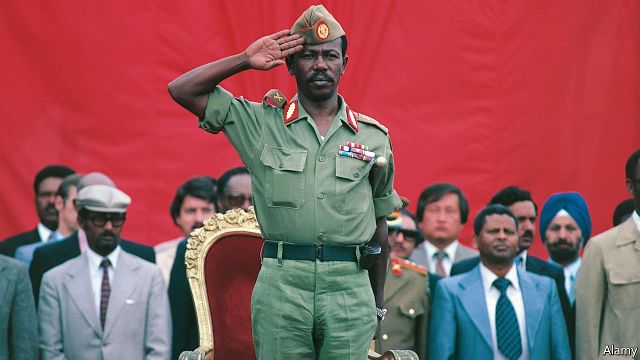Mengistu Haile Mariam born May 1937 in Kaffa, Ethiopia was a career Army officer in the Ethiopian Army.
Mengistu Haile Mariam born May 1937 in Kaffa, Ethiopia was a career Army officer in the Ethiopian Army.
After the student uprising that led to the downfall of King Haile Selassie, Ethiopian army seized control of the country. Mengistu was named vice chairman of the Provisional Military Administration Council (PMAC) which was run by the Armed Forces Coordinating Committee or Dergue.
Human Rights Violations
On November 23, 1974, Mengistu ordered the assasination of the PMAC Chairman along with over 60 former officials. Through assassinations, Mengistu assumed control over Ethiopia.
In 1977, Mengistu began a campaign of assassinations known as “Red Terror” directly targeting civilians and opposition. Amnesty International archives from November 1978 details some of Mengistu’s Red extrajudicial detention, torture and executions. Amnesty - HUMAN RIGHTS VIOLATIONS IN ETHIOPIA
Mengistu was responsible for indiscriminate killing of civilians, opposition members and leaders across Ethiopian Regions. During Mengistu’s Regime, the Oromo language was banned with severe suppression of culture and way of life. The suppression included lack of access to Ethiopian institutions including education, health, employment to government services. Oromo often had to change family names to avoid being discriminated against.
During Mengistu’s Regime, Oromo were subjected to forced displacement as a result of villagization programs (Article 18 of the 1975 Land Reform Proclamation) aimed at resettling Northerners on Oromo and other Nationals land. These policies have further exasperated ethnic conflict
Mengistu’s policies designed to punish opposition resulted in the 1983 to 1985 famine in Oromo Wollo and Tigray Regions. Experts estimate the famine cost the lives of 1.2 Million civilians.
Regime Collapse
In the late 1980’s Russian support for Mengistu began to decline. By 1991, Mengistu’s army took heavy losses by rebel armies from Eritrea, Tigray, Oromia and Ogaden resulting in the defeat of the Dergue forces. Mengistu fled to Zimbabwe.
Rebel leaders from Tigray, Eritrea, Oromo formed a transitional government brokered by the United States. Tigrayan and Eritrean attempts to marginalize Oromo resulted in Oromo leaders pulling out of the transition Government. Rebel forces from Tigray and Eritrea attacked Oromo forces and civilians, resulting in continuation of conflicts.
Tigrayan elected their former rebel leader, Meles Zenawi, to become Ethiopia’s Prime Minister. Meles held power until his death in August 2012.
In December 2006, Mengistu Haile Mariam was convicted in absentee for Genocide and given a life sentence. The ruling was changed to death sentence after prosecution appealed the initial ruling.
"Mengistu Haile Mariam | president of Ethiopia". Encyclopedia Britannica. Retrieved 2018-04-07.




